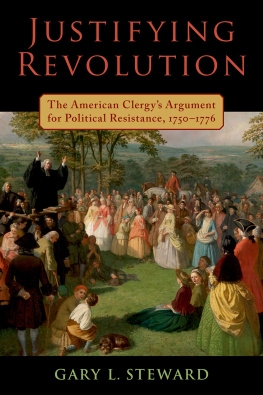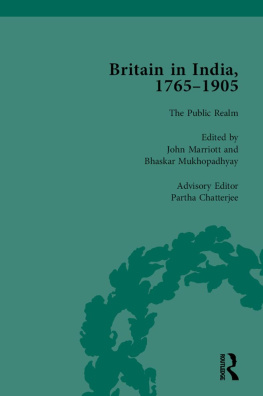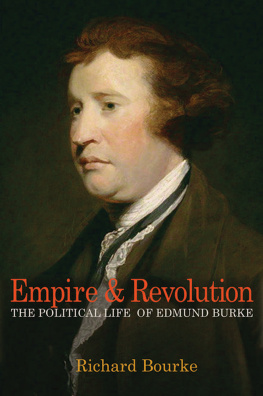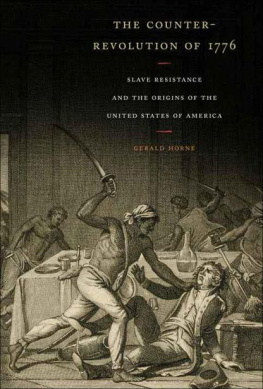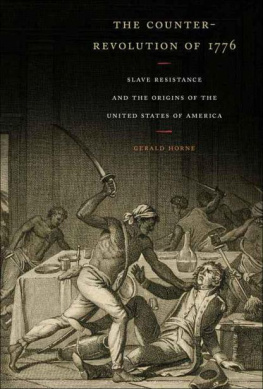Pauline Maier - From Resistance to Revolution: Colonial Radicals and the Development of American Opposition to Britain, 1765-1776
Here you can read online Pauline Maier - From Resistance to Revolution: Colonial Radicals and the Development of American Opposition to Britain, 1765-1776 full text of the book (entire story) in english for free. Download pdf and epub, get meaning, cover and reviews about this ebook. year: 1973, publisher: Knopf, genre: Politics. Description of the work, (preface) as well as reviews are available. Best literature library LitArk.com created for fans of good reading and offers a wide selection of genres:
Romance novel
Science fiction
Adventure
Detective
Science
History
Home and family
Prose
Art
Politics
Computer
Non-fiction
Religion
Business
Children
Humor
Choose a favorite category and find really read worthwhile books. Enjoy immersion in the world of imagination, feel the emotions of the characters or learn something new for yourself, make an fascinating discovery.

- Book:From Resistance to Revolution: Colonial Radicals and the Development of American Opposition to Britain, 1765-1776
- Author:
- Publisher:Knopf
- Genre:
- Year:1973
- Rating:5 / 5
- Favourites:Add to favourites
- Your mark:
- 100
- 1
- 2
- 3
- 4
- 5
From Resistance to Revolution: Colonial Radicals and the Development of American Opposition to Britain, 1765-1776: summary, description and annotation
We offer to read an annotation, description, summary or preface (depends on what the author of the book "From Resistance to Revolution: Colonial Radicals and the Development of American Opposition to Britain, 1765-1776" wrote himself). If you haven't found the necessary information about the book — write in the comments, we will try to find it.
From Resistance to Revolution: Colonial Radicals and the Development of American Opposition to Britain, 1765-1776 — read online for free the complete book (whole text) full work
Below is the text of the book, divided by pages. System saving the place of the last page read, allows you to conveniently read the book "From Resistance to Revolution: Colonial Radicals and the Development of American Opposition to Britain, 1765-1776" online for free, without having to search again every time where you left off. Put a bookmark, and you can go to the page where you finished reading at any time.
Font size:
Interval:
Bookmark:
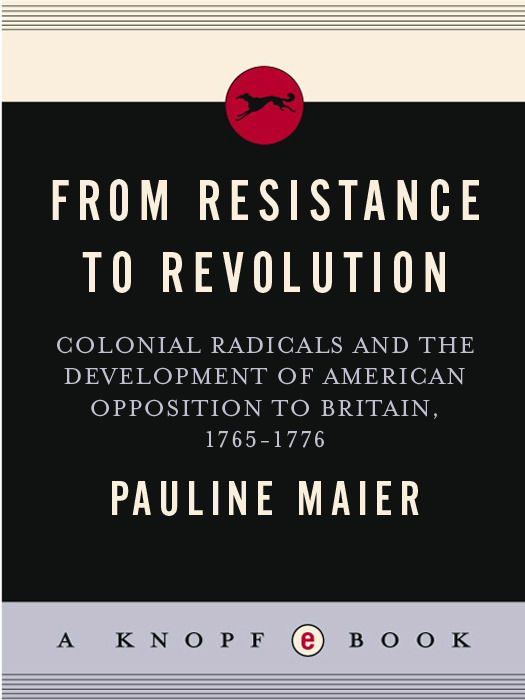
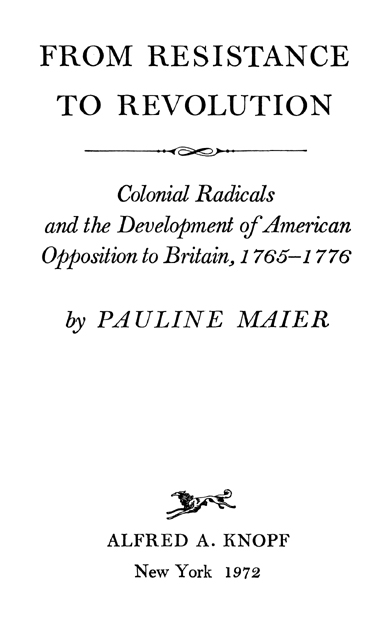
THIS IS A BORZOI BOOK
PUBLISHED BY ALFRED A. KNOPF, INC.
Copyright 1972 by Pauline Maier
All rights reserved under International and Pan-American Copyright Conventions. Published in the United States by Alfred A. Knopf, Inc., New York, and simultaneously in Canada by Random House of Canada Limited, Toronto. Distributed by Random House, Inc., New York.
Library of Congress Cataloging in Publication Data Maier, Pauline, 1938. From resistance to revolution.
Includes bibliographical references.
1. U. S.HistoryRevolutionCauses. I. Title.
E210.M27 973.3 74154904
eISBN: 978-0-307-82806-4
v3.1
For my parents
The Revolution of the United States was the result of a mature and reflecting preference for freedom, not of a vague or ill-defined craving for independence. It contracted no alliance with the turbulent passions of anarchy, but its course was marked, on the contrary, by a love of order and law.
Alexis de Tocqueville,
Democracy in America


W HEN THE A MERICAN REVOLUTIONARIES first came to interest me nearly nine years ago, prevailing historical interpretation suggested they were not worth serious study. Propaganda was the key concept: revolutionary writings revealed only how a handful of agitators, dedicated to independence for their own psychic or material satisfactions, manipulated the mass of colonists. By now it seems surprising that this view remained convincing for so long.
No leader, not even the most outspoken American partisan, was anti-British when the long evolution of events that culminated in revolution first began. Affection for Britain, her constitutional monarchs and government, pervaded the private correspondence as well as public pronouncements of the Sons of Liberty, who organized against Britains Stamp Act of 1765. Separation was to be shunned; independence was mentioned only as a gloomy possibility which, hopefully, timely action could preclude.
Development and change have become, then, an important historical problem: When and why did the colonists reshape their views of the Mother Country and her once revered constitution? The discussion of American actions can now also be reopened. What type of response to British oppression did colonial leaders advocate? How did the Americans changing assessments of their political situation within the British governing system affect their tactics? Response was deliberately related to political disillusionment. As the Americans moved in definable stages away from their loyalty of 1765, so they abandoned step by step the tactic of resistance that opposed only discrete aspects of Londons rule for revolution and a rejection of all British authority.
To understand the emergent revolutionary movement, this study concentrates upon men in the vanguard of opposition to Britain, whom I have chosen to call radicals. The term has pitfalls. The word itself is an anachronism, since it was first applied to political groups only in the nineteenth century. (Observers in the 1760s and 1770s sometimes used the word violent much as we use radical, without necessarily implying the commission of acts of violence in the modern sense, which has itself encouraged historical confusion.) Radical is, nonetheless, a legitimate and in fact technically exact word for describing men who most thoroughly criticized British governing practices, seeking always a return to what they considered traditional principles of British rule.
I do not use the word as the old Progressive historians did, to denote a stable group of persons who emerged in the 1760s or earlier and continued on into the 1780s, constantly struggling for greater political democracy. No such group existed. The movement against Britain was largely decentralized. Anything resembling central direction emerged only rarely before the first Continental Congress in 1774. Still, there was considerable consultation between local leaders who sought each other out from the Stamp Act crisis on, and it is this largely informal intercolonial cadre and the men of like sentiments whom I designate as radical. They constituted the nucleus of opposition to Britain. Through them one can follow a series of increasingly damaging assessments of Britain as well as the progressive elaboration of resistance tactics and organization, which began with the Sons of Liberty of 17656, then was continued within the nonimportation movement of 176870, the Tea Act resistance, and the associations and committees that flowered after 1773. These men took widely different positions on the political issues that arose once independence was decided upon.
Naturally enough, there was a turnover in radical personnel as the nature of American opposition changed between 1765 and 1776. John Dickinson of Pennsylvania offers a notable example: he more than any other individual articulated the radical position in the 1760s, but found activism increasingly uncomfortable in the 1770s. Meanwhile, others joined the radical groups or became leaders. A significant group of men, however, emerged as strong American partisans during the Stamp Act crisis and remained in the forefront of opposition to Britain on into the war: Christopher Gadsden in Charleston; Cornelius Harnett in North Carolina; Richard Henry Lee in Virginia; John Lamb and Isaac Sears in New York; Samuel Adams in Boston, or the peripatetic Thomas Young, who opposed the Stamp Act as a Son of Liberty in Albany, then migrated to Boston, thence from 1774 to Newport, and finally Philadelphia, finding a home always within the local radical group.
It is the personal letters and public statements of such men and their colleagues, along with the newspapers they published and supported, that provide the basis for the interpretations offered herealthough accounts of events by less committed colonists and by British officials have also been consulted. To a large extent, above all in cases the Americans perceived political processes correctly, but judged them by standards far different from those of modern historians or influential Englishmen of their own era. The emoluments that built a majority for the Crown in the English Parliament they saw only as corruption. The toleration the Crown extended to Catholics at home, in Grenada, and the West Indies they perceived only as a replay of Stuart efforts to re-entrench despotism. But accuracy of perception or interpretation according to the modern viewpoint or even that of Georgian England is irrelevant for understanding the escalation of colonial opposition. American decisions were necessarily based upon the information filtered back to the colonies and interpreted from a provincial view.
Point of view raises the issue of the mentality colonists brought to shaping evidence, that is, the issue of ideology. Here I am particularly indebted to Bernard Bailyn, from whom I received my introduction to the American Revolution, and who supervised the doctoral dissertation upon which this book is based. I share with him, above all, a conviction that the set of ideas brought together in the Real Whig tradition of seventeenth- and eighteenth-century England are of central importance in explaining the American Revolution; that, in fact, the revolutionary movement takes on consistency and form only against the background of English revolutionary tradition. Not that every colonist spent his evenings reading Francis Hutchesons
Font size:
Interval:
Bookmark:
Similar books «From Resistance to Revolution: Colonial Radicals and the Development of American Opposition to Britain, 1765-1776»
Look at similar books to From Resistance to Revolution: Colonial Radicals and the Development of American Opposition to Britain, 1765-1776. We have selected literature similar in name and meaning in the hope of providing readers with more options to find new, interesting, not yet read works.
Discussion, reviews of the book From Resistance to Revolution: Colonial Radicals and the Development of American Opposition to Britain, 1765-1776 and just readers' own opinions. Leave your comments, write what you think about the work, its meaning or the main characters. Specify what exactly you liked and what you didn't like, and why you think so.


